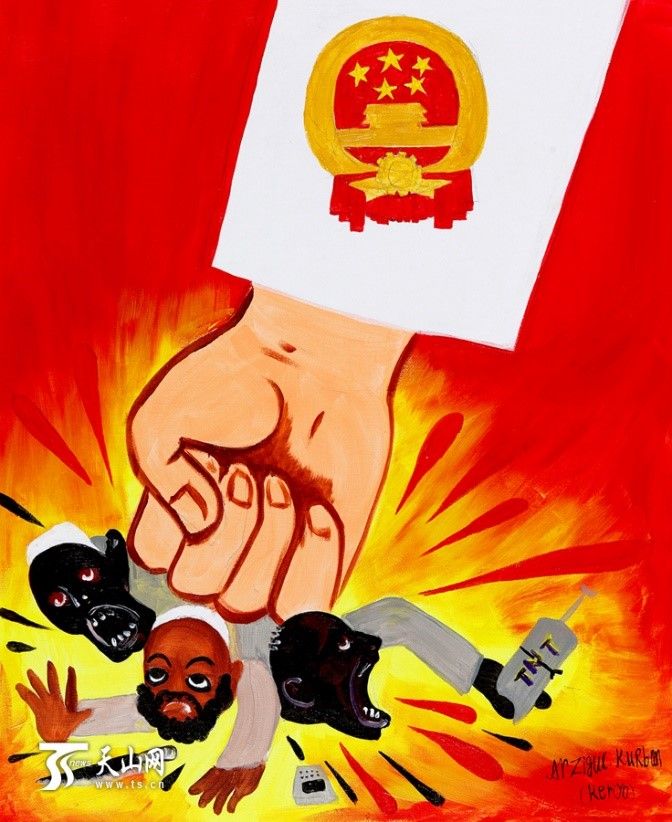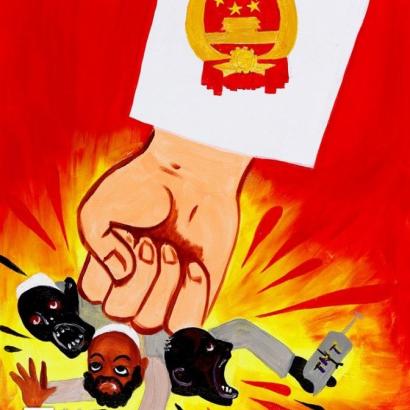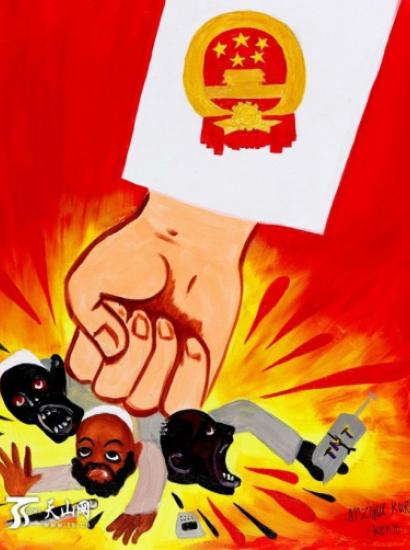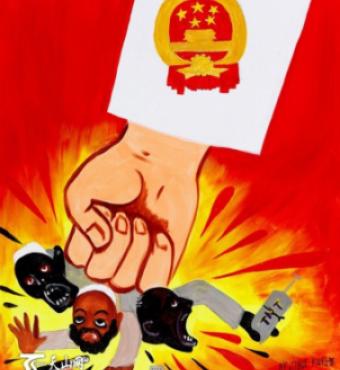- Law & Policy
- Civil Rights & Race
Islam came to China in the seventh century when Muslim envoys in the service of the third Caliph Uthman traveled to Guangzhou (previously Canton) to discuss trade and diplomacy with the Tang Dynasty (618-907). The Emperor Gaozong had a mosque erected in their honor, and for the next few hundred years the majority of Muslims in the Chinese empire were sojourners traveling from Arabia and Persia as merchants. It was not until the Mongol Yuan Dynasty (1271-1368) that Muslims really started to settle permanently in China. The Mongols imported Persians and Central Asians to work as administrators and bureaucrats, while also deploying large embassies to places like Bukhara and Samarkand to facilitate trade and diplomatic relations.
By the Ming (1368-1644) and the Qing Dynasties (1644-1911), Muslims were an integral part of court politics and foreign diplomatic engagement with Central and South Asia. In fact, the famous Chinese admiral Zheng He whose treasure ships traveled throughout Southeast Asia and the Indian Ocean during the Ming Dynasty was selected to lead the expeditions in part because he was a Muslim. Starting in the eighteenth century, the Manchu Qing greatly expanded the territory of the Chinese state and Xinjiang (which literally translates to “new frontiers”) was violently incorporated into the imperial fold. This meant that the highly diverse and majority-Muslim populations (both settled oasis dwellers and nomadic herdsmen) inhabiting the area were brought under imperial purview. Throughout Qing rule, there were a number of highly-coordinated and successful Muslim rebellions against the Qing which were brutally suppressed by the state.
This brief history might not seem relevant to current concerns, but it provides context for both the long-standing tensions and accommodations made for and by Muslims living in both the modern nation-state and the Chinese imperial state which preceded it. When the Chinese Republic inherited the vast terrain of the Qing Empire after 1911, maintaining its territorial integrity was of utmost importance for the Nationalists who fought hard to win the loyalty of Muslims in China in the face of Japanese, Soviet, and British advances and overtures in the Chinese borderlands.
It is also important to understand that within the Islamic community in China there is a great amount of diversity. Among the fifty-five-government designated ethnic minorities beyond the Han, ten are classified as Muslim groups. The Uyghurs and the Hui, who are the only Muslim minority whose first language is Chinese, make up the sizable majority of the Muslim population. In addition, there are other Central Asian minorities, such as Uzbeks, Kyrgyz, Tatars, and Tajiks, as well as a small population of Tibetan Muslims. Apart from the Tajiks, all the Muslims are Sunni, and the majority adhere to the Hanafi legal school of Islamic jurisprudence. There are a number of different schools of Islamic thought, some which are older, like the Gedimu (from the Arabic Qadim – The Old) and others which are newer, twentieth-century imports from the Middle East, such as the Yihewani (from the Arabic Ikhwan – Muslim Brotherhood) and the Salafiyya (orthodox Sunni Islam). Beyond these markers of distinction within the Islamic community, there are also old and active Sufi networks all over China. Clearly the Muslim community in China is extremely diverse, often leading to tensions between the different Muslims communities which can be used and exploited by the state. As China begins its re-ascension to a dominant world power in the twenty-first century and continues to push its “One Belt, One Road” (OBOR) initiative, the way that the state deals with Muslims both inside and outside the PRC will come under increasing scrutiny.
Dru Gladney, an anthropologist who works predominantly on Muslims minorities in China, has argued that the state apparatus in China has held two opposing outlooks about the place of Muslims in their domestic and foreign politics: Muslims are either accommodated or they are considered a separatist threat to the state. Similarly, Gladney points out that beyond the boundaries of the state itself, Chinese Muslims play a role in foreign policy that is disproportionate to the size of their community within the PRC. Another scholar of ethnicity in China, Michael Dillion, recently pointed out that 94% of the population in China are classified as Han, yet minorities—who make up just 6% of the population—are dispersed throughout autonomous regions that make up 64% of the landmass of the country, including Tibet and Xinjiang. The often-precarious hold that the PRC has over these volatile border regions coupled with the geopolitical significance of these areas also dictates how the state handles the perceived threat of Islamic separatism in Muslim-majority Xinjiang.
Many people underestimate the role that Muslims play in China’s foreign relations with neighboring Muslim and non-Muslim countries. With regards to citizens of the People’s Republic beyond the borders of the Chinese nation-state, there are three interrelated yet separate issues that dictate how the Chinese government pursues foreign policy and deals with the threat of increasing Islamism in the region since the beginning of the war on terror. Firstly, a growing number of overseas Han Chinese are conducting business in Muslim countries, such as Pakistan and the Gulf States. Secondly, the number of overseas Muslim Chinese who live and work in places like Indonesia and Malaysia, but who maintain strong connections to the PRC is also increasing. These communities usually operate autonomously from the Han, and find it easier to acclimate to local surroundings given their understanding and respect for Islamic customs and rituals. Finally, there is the pressing issue of the Uyghur diaspora and the increasingly stringent crackdown on Uyghurs in Xinjiang and abroad, such as the recent roundup of Uyghur students by Egyptian police for deportation back to China. Technically, all three of these groups are citizens of the PRC, but the Chinese state’s approach to dealing with them varies widely.
The PRC sees itself as the guardian of overseas Chinese, whether they are Muslim or not. The deepening presence of ISIS in Asia affects both the overseas Chinese community and Chinese diplomacy dealing with its neighbors. Recently, two Han Chinese businesspeople were kidnapped and murdered in Pakistan and ISIS claimed responsibility. This event had led to tension between the growing Chinese business interests in Pakistan and the local community who sees non-Muslim Han Chinese as an emerging threat. Analysts are skeptical that a Chinese cash infusion into Pakistan will stabilize the country, and if ISIS starts to directly target Chinese citizens, it is likely that the PRC will take a much harder line toward its Muslim neighbors where ISIS operates, such as the Philippines and Pakistan.
Beyond these threats to the Han, the particular cases of the Hui and the Uyghurs illustrate the difference between state policies or accommodation and suppression. The Hui are often touted as the model Muslim minority who resist extremism and separatism, follow state directives, and foster economic development with other Muslim countries. A recent article by Chow Bing Ngeow and Hailong Ma explains how the thriving ‘overseas Chinese Muslim’ community in Malaysia is made up mostly of Hui Muslims. They argue that the Hui diaspora in Malaysia maintains important business connections to China for ventures such as their growing halal food industry. During the 1980s and 1990s Muslim students from the poorer Northwest chose cheaper and majority-Muslim alternatives to studying abroad such as Malaysia, Egypt, Saudi Arabia, and Turkey. In essence, these students were re-establishing connections that had been made in the late nineteenth and early twentieth century, and in the early 1980s the first Muslim students from China in more than thirty years traveled to Egypt to study at Al-Azhar. These communities of Hui Muslims are important for business and development in the poorer, interior of China, but they also allow the state to present itself as benevolent protector of the interests of their Islamic citizens abroad.
At the other end of the spectrum, there are the Uyghurs. The threat of terrorism from Uyghurs both inside China and outside of China is at the same time real and exaggerated. Recently, a Kyrgyz Court sentenced three men in a terrorist attack on the Chinese Embassy in Bishkek. The men were said to be affiliated with the Turkestan Islamic Party (TIP) which maintain ties to Jabhat al-Nusra. The men entered Kyrgyzstan on fake passports through Tajikistan after training with al-Nusra in Syria. There have also been a number of attacks by Uyghurs in China, however, their links to terrorist groups such as ISIS or al Qaeda outside of China are hard to prove. For careful observers of Xinjiang politics, these attacks seem more directed toward oppressive state policies aimed at Uyghur assimilation rather than indicating any sort of coordinated Islamist threat. In essence, the rhetoric of the war on terror gave the Chinese government the vocabulary it needed to institute increasingly hard-line policies in Xinjiang to resist separatism and increase its efforts to assimilate the Uyghurs. In the face of this suppression, many Uyghurs have fled China, and since it is difficult for them to get passports, many do so illegally. In recent years, countries like Thailand have extradited Uyghurs who had been smuggled in illegally, returning them to China knowing full well that they will likely face incarceration or worse. This cooperation by the Thai government speaks to the economic and political clout that China carries in the region, as it exerts pressure on its neighbors to return Uyghurs who flee oppression.
As the Chinese government continues to crack down on Muslims living beyond the borders of the Chinese nation-state and as it tightens its grip on social media within the PRC, this increased oppression could lead to a backlash abroad. Although the state is able to tightly control the movement and suppress the activities of Uyghurs in Xinjiang, their economic involvement with OBOR and the growing concern among Muslims outside of China regarding the crackdown on the Uyghurs could exasperate these fragile economic and diplomatic relationships. Recent reports coming out of Xinjiang indicate that all electronic devices including laptops and phones must be registered with police, and earlier this year a prefecture in Xinjiang ordered that all cars have GPS installed for satellite tracking. Observers of politics in Xinjiang have even warned of the emergence of a ‘perfect police state’ aimed at subduing all forms of Uyghur dissent. However, as China continues its reengagement with majority-Muslim countries, it may find itself compelled to develop policies of accommodation instead of escalating suppression.
















